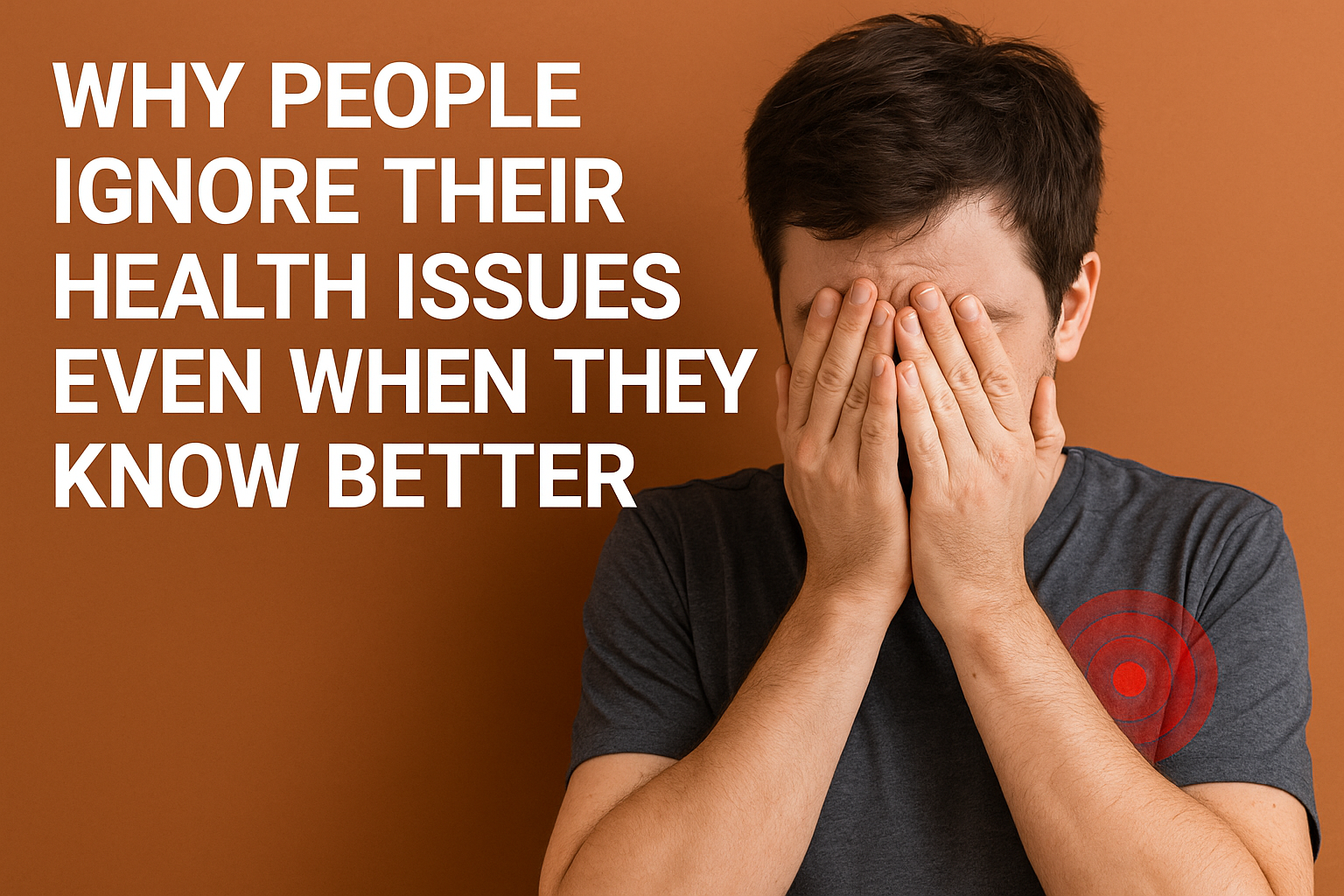Let’s be honest — most of us know what we should be doing.
Eat healthy. Move more. Sleep well. Manage stress.
Yet somehow, even with all this knowledge, millions keep ignoring their health problems every single day.
Why?
It’s not about being lazy or careless.
The real reasons are way deeper — and understanding them is the first step to real change.
Let’s dive into the truth:
1. The “It Won’t Happen to Me” Mindset
One of the biggest reasons people ignore health warnings is the belief that bad stuff happens to others, not to them.
- “Sure, smoking causes cancer — but my uncle smoked till 90!”
- “Yes, junk food is bad — but one burger won’t kill me.”
This sense of invincibility is powerful — and dangerously misleading.
By the time reality hits, often it’s too late.
2. Life Is Busy — Health Feels Optional
Modern life is a non-stop hustle.
Work, bills, family, side hustles, notifications buzzing 24/7…
Taking care of your health? It feels like one more thing on an endless to-do list.
The truth?
When people are tired, overwhelmed, and stressed, health habits are the first thing they drop — even if they know better.
3. Immediate Gratification > Long-Term Benefits
Human brains are wired for short-term rewards.
Eat a donut now? Feels great.
Go for a 30-minute walk? Meh, benefits come years later.
That’s why it’s so easy to choose comfort today and ignore consequences tomorrow.
The future feels far away — until it isn’t.
4. Denial Is Easier Than Facing Fear
Sometimes deep down, people know something is wrong —
- That lump shouldn’t be there.
- That chest pain isn’t normal.
- That fatigue isn’t “just aging.”
But facing it is scary.
It’s easier (and feels safer) to pretend it’s no big deal than to risk hearing bad news from a doctor.
Denial is a protection mechanism — but it comes at a high cost.
5. Bad Experiences With Healthcare
Sadly, many people have had negative experiences with doctors, hospitals, or health systems.
- Feeling judged about weight
- Being dismissed about symptoms
- Dealing with expensive medical bills
These experiences create a deep sense of mistrust.
So instead of seeking help early, people delay and avoid — often until things become critical.
6. Mental Health and Motivation Crash
Anxiety, depression, and chronic stress drain the energy needed for self-care.
When you’re struggling mentally, even simple things like drinking enough water or taking medication can feel impossible.
Mental health challenges quietly destroy physical health habits.
And the worst part? It often goes unseen and untreated.
7. Environment Makes Healthy Choices Hard
It’s not just willpower — it’s the world you live in.
- Fast food chains on every corner
- Junk food ads flooding your social feed
- Cities built for cars, not walking or biking
When your environment pushes unhealthy options at every turn, making good choices becomes an uphill battle.
8. Affordability: Healthy Living Feels Like a Luxury
In many parts of the world, healthy food, gym memberships, therapy, and regular doctor visits are seen as luxuries, not necessities.
The reality?
- Fast food is often cheaper than fresh produce.
- Health insurance costs are sky-high.
- Mental health support is expensive and hard to access.
When money is tight, people prioritize survival over long-term health — and it’s not their fault.
According to the State of Food Security and Nutrition in the World 2024, over 55% of India’s population cannot afford a healthy diet.
This is not just a personal failing — it’s a system failure.
9. Social Pressure Normalizes Unhealthy Habits
In many places, it’s cool to be unhealthy.
- Celebrating binge drinking
- Skipping sleep to hustle
- Making fun of “health freaks”
When the culture around you normalizes bad habits, ignoring your health doesn’t even feel like a conscious decision anymore.
When unhealthy living becomes the new normal —
- Everyone skips exercise.
- Fast food is dinner 5 nights a week.
- Sleeping 4 hours is a “grind culture” badge.
It stops feeling weird.
You don’t feel like you’re doing anything wrong… because everyone around you is doing the same.
Final Word: Knowledge Isn’t Enough
In 2025, there’s no shortage of health information.
Google, YouTube, Instagram — it’s all out there.
The real problem?
Bridging the gap between knowing and doing.
Health isn’t just about willpower.
It’s about fighting against busy schedules, emotional struggles, broken healthcare systems, and social pressures.
If you find yourself ignoring health issues, you’re not alone — but you deserve better.
Your future self is quietly begging you to take one small step today. 💪
Because at the end of the day — nothing is more expensive than losing your health.



